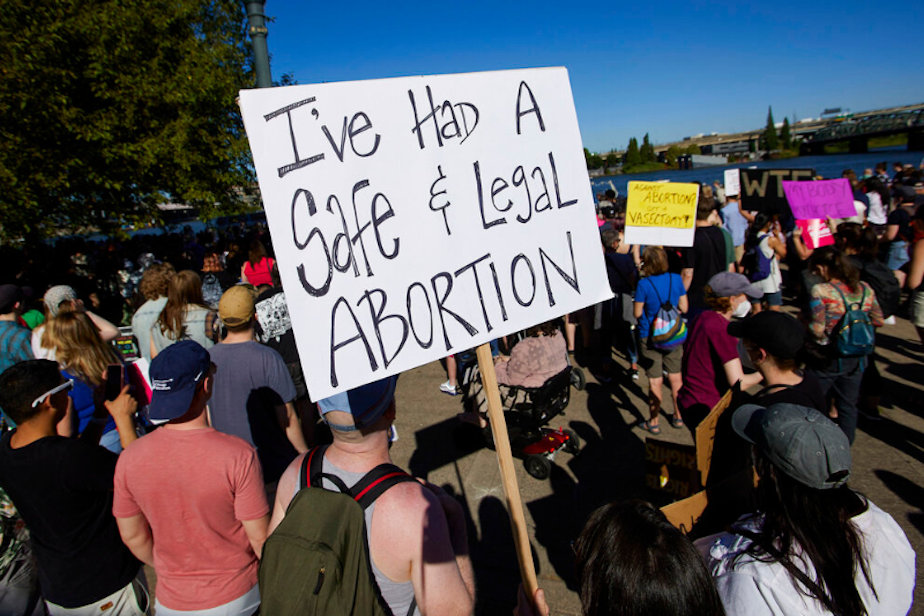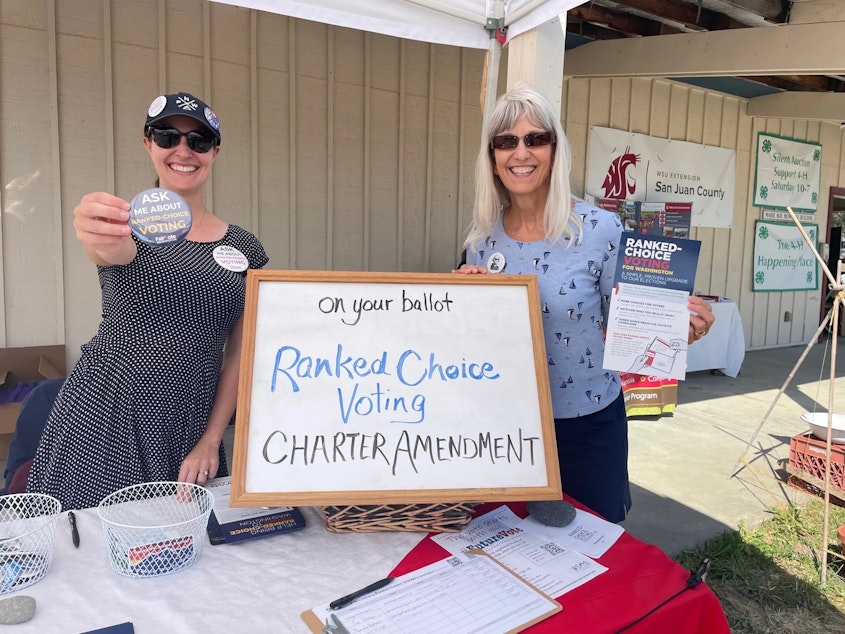Abortion rate falls in Idaho, but rises in Washington and Oregon: Today So Far

- A Seattle detective had an awkward, and scary, encounter with undercover King County Sheriff's detectives.
- How Seattle police investigated allegations against Raz Simone will be included in an ongoing court case.
- You may notice billboards going up around Washington soon, stating “Dear abortion seeker, you are welcome here. From Washington.”
This post originally appeared in KUOW's Today So Far newsletter for November 3, 2022.
Well this was awkward, and probably pretty scary too. A Black Seattle detective had to call for backup while a truck was aggressively tailgating her on the road. Patrol cars sped to her location and pulled the truck over to find out that the tailgaters were undercover King County Sheriff's detectives.
This all happened in 2021, on the anniversary of Breonna Taylor's death. The Seattle detective was undercover, keeping an eye on demonstrations. So were the deputies in an unmarked white truck, though they were primarily charged with security around light rail stations. The deputies saw the detective driving around the protest and, according to them, recognized the car from previous demonstrations. So they took it upon themselves to follow the car, driving aggressively behind it. The deputies called this “an obvious, overt follow,” basically a move to get someone suspicious to leave the area. From the Seattle detective's perspective, she could have been followed by counter protesters, like Proud Boys rumored to be in the area.
The incident has prompted an investigation into the deputies' methods. Read about that here.
In other Seattle police-related news, the case against hip-hop artist Raz Simone is moving forward and SPD will be included. Previously, it was not known whether SPD's investigation methods would be included in the case against Simone. Now, a judge's conclusion states that the way police investigated may have emboldened Simone. As things proceed, how police investigated the series of allegations will be a part of the court case. Read more here.
You may notice billboards going up around Washington soon, stating “Dear abortion seeker, you are welcome here. From Washington.” This is part of an effort from Pro-Choice Washington that is following up on the Supreme Court's controversial Dobbs decision in June.
"There are a lot of anti-abortion access and abortion rights billboards, and you don’t really see the side that is about health care," Kia Guarino, executive director of Pro-Choice Washington, told KUOW.
Washington and Oregon are known for protecting abortion rights, however, neighboring Idaho has considerably tightened and restricted abortion access. That has led many to worry that women will start crossing state lines for medical care. An early look at some numbers appear to back up that concern.
In Idaho, the number of abortions per month has fallen by 48%. The same rate has increased in Washington state by 5%, and in Oregon by 18%. Read more here.
Correction: The initial version of this newsletter stated that undercover officers and deputies were covering protests amid 2020 CHOP. Instead, they were covering demonstrations in 2021 around the anniversary of Breonna Taylor's death.
AS SEEN ON KUOW

Volunteers with the Fair Vote Washington campaign work to inform voters about ranked choice voting in San Juan County. This November, Portland, Seattle, and three counties in Washington and Oregon are considering ranked choice voting. (Courtesy of Fair Vote Washington)
DID YOU KNOW?
It's November and despite what is being advertising to you, it is NOT Christmas season yet. The next holiday is Thanksgiving, which is a lot like Christmas with a big meal and gathering with loved ones, but without predictable Hallmark films, or adding to the pile of clothes that I pretend to like but will never wear until the family member who gifted them to me comes around ... but I digress.
Thanksgiving and Christmas have long had a timing tug-of-war. Today, we call it the "Christmas creep" — the attempt by retailers to introduce Christmas merch earlier and earlier to get an edge on those holiday dollars. This led to "Franksgiving" from 1939 to 1941. President Abraham Lincoln started the tradition of celebrating Thanksgiving on the last Thursday of the month, by presidential proclamation. In 1939, however, that meant it would fall on Nov. 30. That made retailers nervous about Christmas sales getting a late start. So President Franklin D. Roosevelt decided to up the holiday a week with the idea that the buying season would start earlier, too.
Franksgiving became a contentious political issue, splitting Democrats and Republicans, and even divided opinions within the parties. It even brought forth the classic debate of states' rights verses federal authority — some states went with Franksgiving and gave workers the day off, other states kept the old date in outright defiance, calling it "Republican Thanksgiving" (and some decided to take both Thursdays off). If it were an issue today, we'd probably see Thanksgiving flags flown on the back of trucks, and passive aggressive memes sent via Twitter. In the end, Christmas sales weren't affected too much by the date switch ups. So in 1942, FDR and Congress decided to set the Thanksgiving date to what we have today — the fourth Thursday in November.
ALSO ON OUR MINDS

The U.S. is trying to mend ties with Venezuela. One big reason? Oil
Russia's invasion of Ukraine and the ban on Russian oil imports is prompting the U.S. to seek new sources of energy. Because of this, and other reasons, the Biden administration is extending a tentative olive branch to Venezuela.

